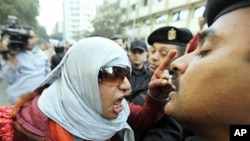Egyptian security forces have deployed en masse across the capital, Cairo, Wednesday amid calls by protest leaders to continue demonstrating despite a ban.
In central Cairo, Egyptian activists clashed with security forces stationed nearby as thousands of Interior Ministry troops stood watch along key roads and bridges to keep passersby from congregating.
The Egyptian Interior Ministry warned on its website that public demonstrations would not be tolerated. Protest organizers reported scattered mobile phone outages and a blockage of the social websites Twitter and Facebook to prevent them from mobilizing supporters.
Top opposition activist Abdul Jalil Mustapha called on President Hosni Mubarak not to seek re-election.
He said the opposition is asking President Mubarak to announce that he will not run for re-election and that his son, Gamal, will not run in his place. Mustapha also insisted that both houses of parliament be dissolved and transparent elections be held.
Video footage of Egypt protests:
The Egyptian stock market also reportedly dropped 4 percent as investors worried about the implications of a rise in turmoil.
Slideshow of Egyptian protests
In nearby Tunisia, security forces fired tear gas at protesters close to the prime minister’s office, as groups of young men threw stones and tried to break through a barricade. Protesters are demanding that interim Prime Minister Mohammed Gannouchi step down.
The prime minister is due to announce a reshuffle of his cabinet. Meanwhile, Education Minister Ahmad Ibrahim urged Tunisians not to get carried away by demonstrations.
|
VOA's Mohamed Elshinnawi speaks with Noureddine Jebnoun, former professor at the Tunisian National Defense Institute:
|
He said it's normal for people to have a certain civic-awareness and to be concerned about protecting the gains of the revolution and keeping it from spinning out of control. But, he adds, it is imperative that protests be organized and peaceful and not stop the country from functioning.
Video footage of Tunisia protests:
An active discussion continues in the Arab press about the possibility of popular protests spreading from one Arab country to the next. However Khattar Abou Diab, who teaches political science at the University of Paris III, insists that each Arab country has its own internal logic.
He said that despite what people say, the idea of contagion from one Arab country to another is not a foregone conclusion and that the situation does not resemble that of eastern Europe after the fall of the Berlin Wall. He stressed that each country has its own context and that government structures vary widely. Tunisia, he noted, has a tradition of separation between religion and state, and a vibrant middle class which led the recent revolt. The army, he added, also joined the revolt.
Conditions differ in Egypt, concludes Abou Diab, because the government, the army and the security forces have a "symbiotic relationship", and the state has a Pharoanic tradition of strong leaders. But, he urged President Mubarak to work slowly to democratize the system to prevent the Muslim Brotherhood and Iran from taking advantage of a political vacuum.




